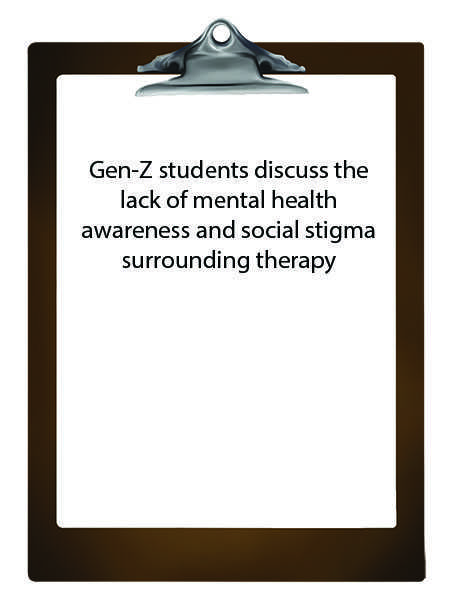Students have began to proactively start conversations about mental health awareness.
As Britney* found herself in yet another lunchtime conversation with a peer about anxiety, she wracked her brain for something to say that would make her friend feel better. After reflecting on her own positive experiences in therapy, she brought it up in conversation. Her friend went silent. Realizing that she had unintentionally walked into a charged issue, Britney did her best to dismantle any stigma surrounding therapy for her friend, she said.
“I told her that [therapy is] not a cure all, but it’s not shameful. If you don’t want to feel bad, you should take action,” Britney said.
According to a Chronicle poll of 217 students, 21 percent of students said they regularly visit a therapist, while 46 percent of students have consulted one at some point in the past. Of the students who regularly attend sessions, 53 percent said that they feel comfortable talking about therapy with their peers.
Upper School psychologist Sophie Wasson said she thinks that the trend of decreasing stigma surrounding therapy is common for the current generation of high school students.
“[This] generation is much more flexible, expressive and open-hearted to these issues, whereas when their parents and my parents were teenagers, nobody talked about this stuff,” Wasson said.
Students on campus are also becoming more comfortable with discussing their experiences in therapy, Emma Poveda ’20 said.
“It’s really nice to talk to my friends about our experiences in therapy,” Poveda said. “Sometimes I’ll randomly get a text from my friend saying ‘Just had the most bomb session with my therapist.’ It’s nice to see my friends getting supported in this way.”
Although she acknowledged that there will always be stigma surrounding therapy and mental health, Wasson said she thinks that the school’s efforts to decrease these stereotypes have been effective.
The closely knit school community sometimes serves as a support system for those suffering from mental health issues.
“I think that there is a worry about ‘what’s wrong with me if I have to have these discussions and go to therapy,’” Wasson said. “Psychology and psychiatry hold that fear symbolically for lots of families and people who think about making this step. However, I do think that our culture has shifted and people are much more open about what they’re going through. I hear kids all the time say, ‘oh yeah, I’ve got therapy on Tuesday’ or ‘I’ve got family therapy on Friday’ as if it’s just a part of their daily life, not something to be worried or ashamed about.”
Although some students are able to talk about issues with their friends, Peer Support leader Paige Corman ’20 said she finds that many of her peers will share their emotions only in more private situations.
“I know a lot of people who don’t feel comfortable talking about their issues publicly but instead go to Peer Support or see a private therapist to help them cope,” Corman said. “On the other hand, I also know a lot of people who feel comfortable talking about their struggles with mental health.”
Regardless, Corman said she thinks that the school is a supportive environment for those who do choose to share what they are going through.
“It’s definitely a personal decision about how open a person wants to be, but I think the community at Harvard-Westlake is going to be supportive of that person no matter what,” Corman said.
In the same survey, 80 percent of students said that discussions regarding mental health on campus are comfortable between peers.
While he agrees that his classmates are becoming more open to discussing mental health, Alon Moradi ’21 said he believes that the students attracted to the school tend to feel the need to solve problems on their own.
“Harvard-Westlake students have this shared attribute of resiliency and wanting to figure things out on their own, just out of ambition,” Moradi said. “This applies to both the educational and the social and emotional setting.”
This positive trend among the current generation can also be partially tied to their use of the internet and social media, Interdisciplinary Studies and Independent Research Teacher and Counselor Michelle Bracken said.
“[Teenagers’]phones have provided this amount of information where if you’re alone in your room and feeling sad, you can Google all types of information and can talk to other teens,” Bracken said.
More specifically, celebrities impact how students feel about expressing their mental health struggles, Bracken said.
“I think that it is helpful when celebrities come out and talk about their anxiety and depression or severe things like bipolar disorder or suicide attempts,” Bracken said. “Celebrities and athletes that have a platform are really helpful.”
Mass media has also shifted to be more accepting of mental health issues.
While the media has become more open to discussions about mental health, Hollywood seems to be echoing this trend with films that focus on the struggles teenagers face on a day-to-day basis, Wasson said.
“I think movies like ‘Ladybird’ and ‘Eighth Grade’ are starting to talk more seriously about what children are going through,” Wasson said. “Whether or not they actually depict therapy scenes with those kids in the movies is another issue, but I do think the first step that’s being addressed is that there are mental health issues for children going on, so I really applaud those movies and those directors and writers for actually bringing this forward.”
Bracken said that in her experience, discussions of mental health and therapy have definitely improved from prior circumstances.
“I think that getting help and us reaching out and helping people is much more accepted,” Bracken said. “It used to be that we wouldn’t talk about our problems, and now it’s much more accepted to say, ‘Yes, I am struggling with that, and it is hard for me, and I do need to go talk to somebody about it.’”
*Names have been changed.





































